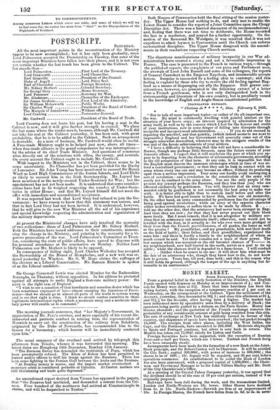POSTSCRIPT.
SATURDAY.
All the most important points in the reconstruction of the Ministry appear to be now accomplished ; but it has only been gradually, since Lord Palmerston accepted the Premiership on Tuesday, that some of the most important Ministers have fallen into their places, and it is not even yet certain whether the last touch has been given to the Cabinet. The list stands thus—
Lord Palmerston First Lord of the Treasury.
Lord Cranworth Lord Chancellor.
Earl Granville President of the Council.
Duke of Argyll Lord Privy Seal. Earl of Clarendon Foreign Secretary.
Mr. Sidney Herbert Colonial Secretary. Sir George Grey Home Secretary. Lord Panmure Secretary for War. Mr. Gladstone Chancellor of the Exchequer.
Sir James Graham First Lord of the Admiralty. Sir William Molesworth Public Works.
Sir Charles Wood President of the Board of Control.
The Marquis of Lansdowne Without office. Lord Canning Postmaster-General.
Mr. Cardwell President of the Board of Trade.
Lord Canning does not leave his post, but his having a seat in the -Cabinet is new, and it will give further strength in council. We place 'the last name where the reader sees it, because, although Mr. Cardwell did not take his scat at the Cabinet yesterday, it has been said, with great probability, that he is to be added to the Cabinet. Such an arrangement is desirable. As a man of business, Mr. Cardwell would often be useful. A Free-trade Ministry ought to be helped just now, above all times— when free-trade alliance is the grand compensator for war interruptions— by the advice of its chief Trade Minister. And questions of commerce arise directly out of the relations with allies, the enemy, and neutrals. On every account the Cabinet ought to include Mr. Cardwell.
With respect to the Ministers not in the Cabinet, there seems to be some uncertainty. No Chancellor has yet been provided for the Duchy of Lancaster. Sir John Young has been mentioned to succeed Sir Henry Ward as Lord High Commissioner of the Ionian Islands, and Lord Elcho as likely to succeed him in the Irish Secretaryship. Mr. Layard has been mentioned as the newly-created Under-Secretary for War ; but the appointment has not yet been made. It is understood that some consider- ations have had to be weighed respecting the number of Under-Secre- -taries in either House ; and that Mr. Layard himself did not meet the offer with immediate and unconditional acceptance.
It was reported last week that Lord Grey had refused to join the Go- vernment: we have reason to know that this statement was untrue, and that in fact Lord Grey had not been invited. It is understood, however, that he will give to the new War Minister all the aid of his experience 'and special knowledge respecting the administration and organization of the military departments.
At present the Ministerial changes have only involved the necessity of two reelections— those of Lord Palmerston and Mr. Sidney Herbert. Both the Ministers have issued addresses to their constituents, announ- cing the change in the Ministry, and pointing to the necessity for a vi- gorous prosecution of the war. Lord Palmerston's Committee at Tiver- ton, considering the state of public affairs, have agreed to dispense with diis personal attendance at the nomination on Monday. Neither Lord Palmerston nor Mr. Herbert is likely to be opposed.
In consequence of failing sight, Lord Charles Wellesley has accepted the Stewardship of the Manor of Hempholme, and a new writ was or- dered yesterday for Windsor. Mr. G. W. Hope claims the suffrages of the electors as a Liberal Conservative. Mr. Samson Ricardo is spoken of as the Liberal candidate.
Sir George Cornewall Lewis was elected Member for the Radnorshire Boroughs, on Thursday, without opposition. In his address he protested against all attempts to make England a first-rate military power : the navy is the right arm of England. "I wish to see a cessation of that inordinate and senseless desire which has been sometimes expressed of late—almost usurping the functions of Provi- dence—that we should go in almost all parts of the world to redress wrong and to see that right is done. I think we should confine ourselves to those legitimate international rights which a moderate army and a moderate mili- tary power will enable us to command."


































 Previous page
Previous page